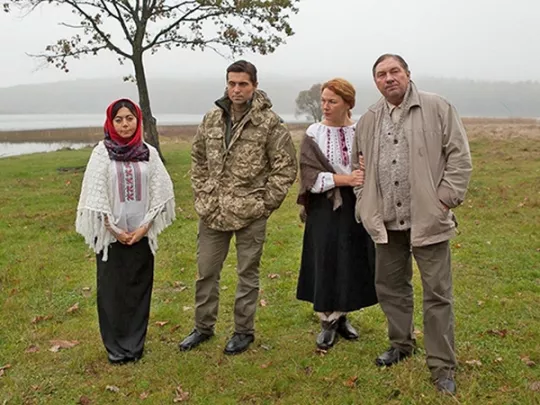Interview with Ali FakhrMousavi in Fakty (Kyiv): On Autumn Memories and Rewriting a Film After the Donbass War

Director Ali FakhrMousavi: “I decided to show what people usually avoid showing”
A premiere of the film Autumn Memories about people with post-traumatic stress disorder was held in Kyiv.
“When the doctor prescribes three months of rehabilitation after his injury, the film’s protagonist breaks down: ‘I can’t go home, I can’t go to the front. Where am I supposed to go?!’” For a Ukrainian viewer today, this single line is enough to understand that the wounded volunteer’s home is “on the other side” of the front line.
Likewise, when viewers see an almost lifeless girl in a hijab found by villagers in a forest near a border village, it’s immediately clear—without any exposition—that this Muslim woman is an illegal migrant deceived by a smuggler-guide. The calamities that befell her homeland made her disabled and orphaned and forced her to spend her last savings just to leave her home. She is in an even worse situation than the widowed village sculptor who shelters her.
Worse than the soldier who has nowhere to return to—though at least he is still in his own country. The girl, meanwhile, must cling to the edge of a foreign land where everything is unlike her homeland…
“I decided to show what people usually avoid showing—the problems of those who have nowhere to return to,” director Ali FakhrMousavi told the outlet. “Four years ago I conceived a film about migrants fleeing war and trying to survive abroad in a completely new environment. Two years ago, when hostilities began in Ukraine, I completely changed the plot. I decided to show not the war and not the refugees, but life ‘after the war.’ The story of a person who has suffered a personal tragedy or was forced to leave home and must adapt to new circumstances, to a new place—with different traditions, culture, way of life, and language.”
These themes are close to the director himself. A 37-year-old native of Iran, he left his homeland 15 years ago, is married to a Ukrainian, studied and worked in Ukraine, and now works in the Czech Republic. Autumn Memories is his first feature film (a joint Iranian-Czech-Ukrainian project). The film’s characters, who have experienced post-traumatic stress, discover within themselves the capacity to love and to empathize—and that helps them endure the trials that have befallen them.
The widowed village sculptor Oleksandr (played by actor Oleksandr Ihnatusha, familiar to audiences from the TV series Svaty) falls in love with the blind Iraqi refugee Ima (played by Iranian actress Nazanin Ahmadi Shahparoubadi) and helps her regain her sight. But she refuses his marriage proposal. The sculptor’s younger rival, soldier Anatolii (played by Dmytro Linartovych), leaves the village without telling Ima he loves her—and without finding out whether she feels the same. Ima speaks neither Russian nor Ukrainian, while Anatolii knows almost no English. The only “communicator” between the two young people, who have found both shelter and love in a small Ukrainian village, is… a piano. In civilian life Anatolii was a rock musician, and Ima dreamed of becoming a music teacher, but war got in the way.
“Anatolii has to restrain himself—he’s not at home and he’s not in charge,” explains Dmytro Linartovych. He knows well what it means to be “not at home”: he once studied at a boarding school where even going to the canteen meant marching in formation, and in the morning you literally had to make sure no one took your slippers by mistake. He also knows field life: he did his compulsory military service and came to the shoot straight from the training ground in Rivne—mobilized and now doing alternative service at Army FM radio, where he reads letters from the front on air.
“One letter, a poem from a soldier to his mother full of hope—he calms her, promising to return—really struck me,” says Linartovych. “I also remember a short conversation with a fellow serviceman from Donetsk who, after demobilization, will face the fate of a displaced person… Our film has already been seen by soldiers and refugees. I feel great respect and sympathy for them. They’ve been through a lot, suffered hardships, yet they find the strength not to break but to live and move forward. I believe the state must create special social programs for them—these are our citizens.”
In the film Linartovych also sings, and screenings are accompanied by his songs from his author album Mobilization, which he recently recorded.
Autumn Memories (released in Ukrainian and English) is his second major film role. In Firecrosser (Toy, khto proyshov kriz vohon), he played the lead—Ukrainian pilot of the Soviet Army Ivan Dotsenko, who miraculously escaped Nazi captivity, fled the Stalinist camps, flew to Canada, and years later became a chief of an Indigenous tribe.
Autumn Memories was filmed in Lviv region, in a village with a telling name—Dobrohustiv. Villagers also appear in episodes. Local resident pani Halyna provided her house for filming; in her bright room, the film’s heroine (also named Halyna by coincidence), a former village teacher, shelters the wounded soldier who has nowhere to go. For the lonely woman, the soldier becomes, for a time, both student and son.
Halyna Yablonska, People’s Artist of Ukraine and actress of the Ivan Franko National Drama Theater, plays the role so that everyone recognizes in her their own mother, their favorite teacher.
“Not a day went by without someone asking the homeowners who allowed filming on their plots: ‘Nu, yak tam u vas ti kinoznyky?’ (‘So, how are those filmmakers of yours doing?’),” smiles the film’s production designer Ruslan Pysachenko. “All the villagers have already seen the film—and themselves in it. They are proud to have taken part in the shooting.”
“I believe my story will be understood by Ukrainians, by people of the Middle East, and by Europeans,” says Ali FakhrMousavi.